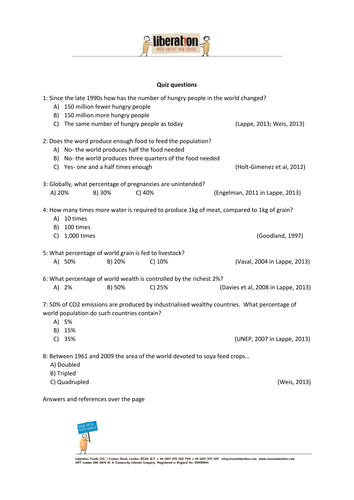12Uploads
3k+Views
2k+Downloads
Economics

Fairtrade food security quiz sheet
Why is there so much hunger while there is so much food?! This quiz which fits with the 2016 Fairtrade Fortnight theme of food security, but can be used at any time.
National Curriculum links:
Key Stage 3
Geography: Place knowledge- UK relationship with the wider world. Human geography processes and change- population and economy.
Key Stage 4
Geography: Human geography processes and change- global economic development issues, the causes and consequences of uneven development at a global level.
A Level
Economics: The international economy- globalisation, trade, market failure- inequity, environment, income distribution.
Geography: International trade, including access to markets, inequality and 'fair trade'; the nature of economic, political, social and environmental interdependence in the contemporary world; inequities of global systems and how they can result in unemployment, poverty and declining welfare standards for some people and localities, and advantages for other people and localities; food production, circulation and consumption.

Fairtrade nut company introduction presentation.
An introduction to a Fairtrade company in the form of answers to questions posed by secondary school students.
Key Stage 4
Business Studies: Understanding international trade, human resources negotiation and consultation, how the business was set up, business aims, organisational structure.
A Level
Economics: Follow up with: The international economy- globalisation, trade, business objectives, asymmetric information, market failure- inequity, environment, income distribution.
Geography: International trade, including access to markets, inequality and 'fair trade'; the nature of economic, political, social and environmental interdependence in the contemporary world; inequities of global systems and how they can result in unemployment, poverty and declining welfare standards for some people and localities, and advantages for other people and localities;
food production, circulation and consumption.


